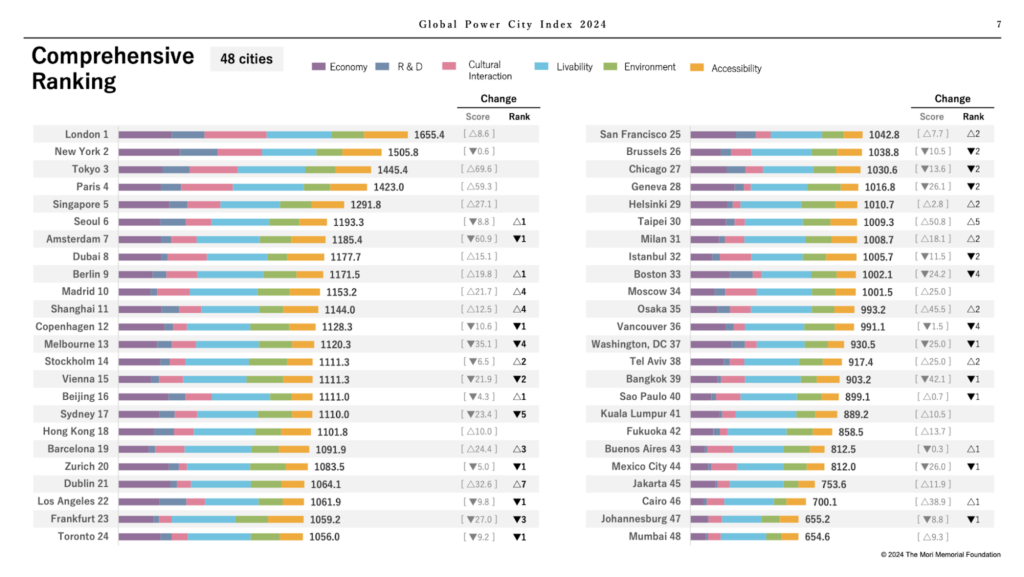Global Power City Index 2024: Tokyo Gains Ground Amid Global Challenges
On December 10th, The Mori Memorial Foundation’s Institute for Urban Strategies unveiled the results of its Global Power City Index (GPCI) 2024. This annual report ranks 48 global cities based on their overall “magnetism,” or attractiveness, using 70 indicators across six functions: Economy, R&D, Cultural Interaction, Livability, Environment and Accessibility. For the second year, the GPCI included a separate Financial Centers index, which evaluates cities’ competitiveness as international financial hubs.
Tokyo saw the largest score increase among all 48 cities, securing 3rd place and narrowing the gap with 2nd-place New York. Significant gains were made in Cultural Interaction, R&D and Accessibility, reflecting Tokyo’s growing international tourism and enhanced infrastructure.
Meanwhile London held onto its top position thanks to improvements in Accessibility and Livability, as well as its enduring cultural allure. However, its lead over other cities narrowed slightly. Since hosting the 2024 Summer Olympics, Paris climbed in Cultural Interaction, increasing its overall score. Singapore retained 5th place, bolstered by improvements in Air Transport Capacity and Livability.

Tokyo’s place among the world’s leading cities highlights Tokyo’s cultural vibrancy and increasing international appeal, particularly through inbound tourism and enhanced cultural interactions. These factors have become increasingly pivotal in reinforcing the city’s global standing, despite challenges stemming from Japan’s economic stagnation and external influences such as currency depreciation.
During the press briefing, Hiroo Ichikawa, Executive Director of the Mori Memorial Foundation, elaborated on these dynamics. He acknowledged that while Tokyo faces limitations due to national economic policies and high corporate tax rates, the city’s proactive efforts in cultural exchange have significantly bolstered its global appeal. “What Tokyo can do is strengthen the cultural interaction portion, and that has led to an enhanced scoring for that area,” he said. However, he also cautioned that Tokyo lags behind aggressive economic initiatives seen in other cities.

Moving forward, Ichikawa pointed to the importance of aligning Tokyo’s urban development policies with national economic reforms to maintain and enhance its position. While Tokyo has made strides in areas such as green urban development and infrastructure, leveraging these advancements alongside targeted economic policies could propel the city further on the global stage.
This year’s findings reflect the global recovery from the COVID-19 pandemic alongside ongoing challenges such as inflation and climate change. Despite these hurdles, economic activity and international mobility have expanded, reshaping city rankings and illuminating areas of strength and opportunity for urban policymakers and developers.
The GPCI–Financial Centers survey, launched last year, highlights the dynamic evolution of financial hubs. Tokyo and London remain key players, while rising cities such as Dubai and Singapore showcase competitive business environments.
Regional Highlights
- Europe: European cities dominated Environmental rankings, with Copenhagen leading in sustainability efforts. Amsterdam experienced a decline in Accessibility and Cultural Interaction, while Madrid re-entered the top 10.
- Asia: Seoul advanced to 6th place, benefiting from gains in R&D and Climate Action. Shanghai moved up to 11th place due to increased international mobility.
- Americas: New York maintained its strengths in Economy and R&D but struggled in Livability and Environment. Toronto showed balanced scores across all functions, demonstrating steady progress.
The GPCI 2024 rankings underscore the growing competition among global cities, offering insights for decision-makers to enhance their urban strategies in fostering innovation, sustainability and economic resilience. See the full rankings below:


